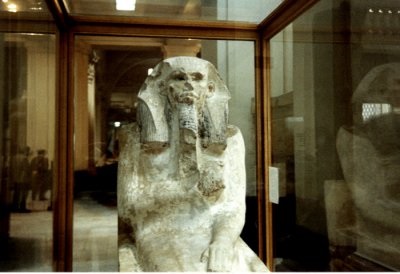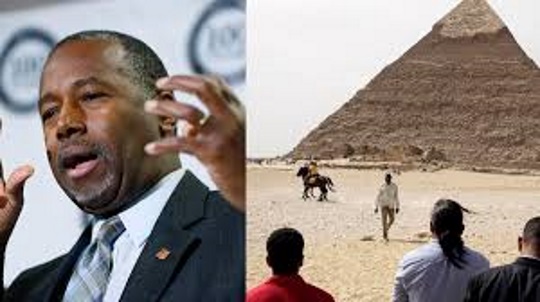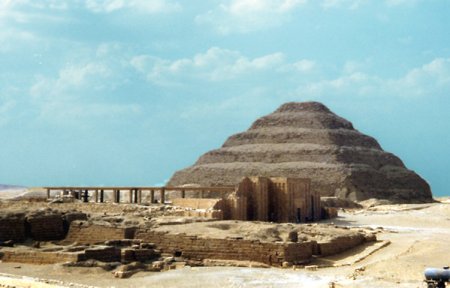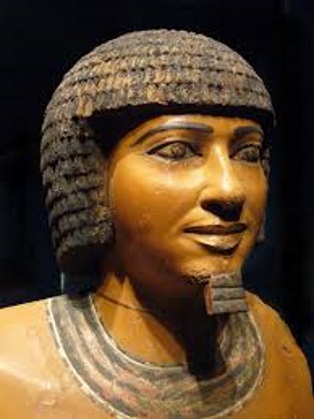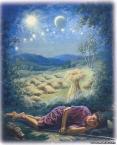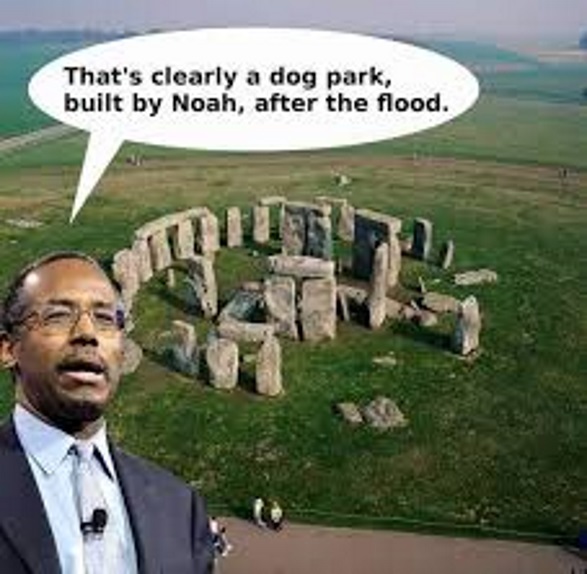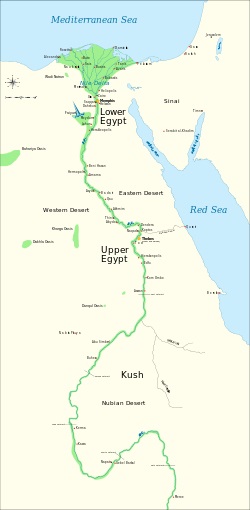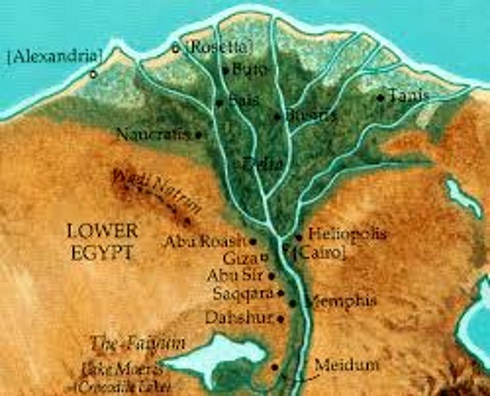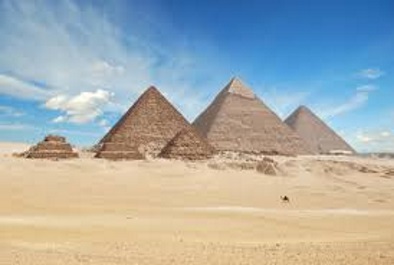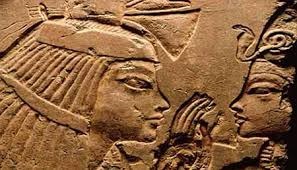|
IMHOTEP AS JOSEPH Unauthorized Research in Non-Bible Sources
|
|
|
|
Dr. Ben Carson received a lot of unfavorable publicity early in his campaign to become President of the United States because of his stated belief that the Biblical story of Joseph son of Jacob was true, that there was indeed a 7-year famine in Egypt in the days of Joseph, and that one or several pyramids was connected in some way with the storage of grain supervised by Joseph.
Imhotep, the Physician Imhotep is the earliest physician whose historical records survive, and although Joseph isn't mentioned as being a physician, the Bible gives one very important clue to this: GEN 50:2 And Joseph commanded his servants the physicians to embalm his father: and the physicians embalmed Israel. Here, the physicians are specificly stated to be under Joseph.
But later, when Imhotep became established as the "god of healing", it is the manner in which he healed that ties him directly to Joseph. Ancient Greek writings mention a great sanctuary at Memphis where people came from everywhere to seek cures from Imhotep. They would pray to him, make offerings and then spend the night in this sanctuary, which was a sort of Lourdes of ancient Egypt. While sleeping, the god, Imhotep, was said to come to people in their dreams and cure them. Is there a connection between Joseph and dreams? GEN 37:8 And his brethren said to him, Shalt thou indeed reign over us? or shalt thou indeed have dominion over us? And they hated him yet the more for his dreams, and for his words. Remember, it was Joseph's dream about he and his brothers binding sheaves- their sheaves stood up and bowed to his- that was one of the causes of their great jealousy of him. GEN 37:20 Come now therefore, and let us slay him, and cast him into some pit, and we will say, Some evil beast hath devoured him: and we shall see what will become of his dreams.
The Wisdom of Imhotep The Biblical account also speaks of Joseph's wisdom: GEN 41:39 And Pharaoh said unto Joseph, Forasmuch as God hath shewed thee all this, there is none so discreet and wise as thou art:. Again, the evidence points to Imhotep. Imhotep was also revered for his wisdom. In several inscriptions from much later times, reference is made to the "words of Imhotep". For example, in "Song from the Tomb of King Intef", we read: "I have heard the words of Imhotep and Hardedef...", and it goes on to explain that their "sayings" were recited in his day. To date, nothing has been found of Imhotep's works, however there are several works of "wise sayings" attributed to one "Ptahotep", who is only known as a vizier of a king from the 5th dynasty. However, there are 5 known "Ptahoteps", all viziers to pharaohs of the 5th dynasty, all priests of Heliopolis, or "On". Evidence seems to indicate that after Imhotep, the trend among viziers became patterned after him, with these later viziers taking credit for Imhotep's actual deeds and his writings- a practice which the Egyptians, among others, were notorious for. Now, let's do some assuming for a moment- let's assume that Joseph wrote a collection of wise sayings, of course, inspired by God. Because of his great favor with the king, these came to be revered by the scribes and people. His fame as a sage spread throughout Egypt and became the standard of wisdom. We know that his wisdom came from the true God of Abraham. Would it not be expected that Joseph would pass on his wisdom from God to those around him? In fact, the Bible says that he did: PSA 105:17 He sent a man before them, even Joseph, who was sold for a servant:...20 The king sent and loosed him; even the ruler of the people, and let him go free. 21 He made him lord of his house, and ruler of all his substance: 22 To... teach his senators wisdom. After Joseph's death, others copied his wise sayings and took credit for them, perhaps adding a bit of their own and changing things to suit them. As these sayings were passed down through several generations, instead of being attributed to Imhotep, they were attributed to Ptahotep, "the voice of" the Egyptian creator, "Ptah". Thousands of years later, several papyruses are found which purport to be copies of "The Instruction of Ptahotep". Could this scenario have happened? There are 2 particular statements in Ptahotep's writings which indicate that this is exactly what happened. At the end of these manuscripts, the writer states that he is near death, having lived 110 years and that he received honors from the king exceeding those of the ancestors,- in other words, he received the most honors ever given a man by a pharaoh. And, we know that Joseph died at the age of 110 years. Well, it gets even more familiar as we examine the text of these manuscripts. They begin as Solomon's Proverbs begin, as instructions to his son, with the admonition they are "profitable to him who will hear" but "woe to him who would neglect them". Keep in mind that the Originator of Joseph's wisdom was also the Originator of Solomon's wisdom, and the parallels between the 2 are undeniable. We are told in the Bible that Solomon knew many, many proverbs: 1KI 4:30 And Solomon's wisdom excelled the wisdom of all the children of the east country, and all the wisdom of Egypt. 31 For he was wiser... and his fame was in all nations round about. 32 And he spake three thousand proverbs: and his songs were a thousand and five. This statement indicates that the concept of a "proverb" was known to the ancient peoples. We aren't told if Solomon was the author of all of these proverbs or whether they were passed down to him from his ancestors. There are examples of proverbs in many ancient civilizations, but the only ones which Solomon recorded by inspiration and today appear in the Bible are very similar to the ancient Egyptian "wisdom literature" which can be traced back to Imhotep. This doesn't mean that Solomon copied from the ancient Egyptians- it means that the God of His Fathers gave the same wisdom to his ancestors, who included Joseph, that He gave to Solomon. We'll compare a few passages of
Ptahotep's writings to the Bible: PRO 3:7 Be not wise in thine own eyes: fear the LORD, and depart from evil. 2) "One plans the morrow but knows not what will be". PRO 27:1 Boast not thyself of to morrow; for thou knowest not what a day may bring forth. 3) "If you probe the character of a friend, don't enquire, but approach him, deal with him alone,..." PRO 25:9 Debate thy cause with thy neighbor himself; and discover not a secret to another". 4) "If you are a man of trust, sent by one great man to another, adhere to the nature of him who sent you, give his message as he said it." PRO 25:13 As the cold of snow in the time of harvest, so is a faithful messenger to them that send him: for he refresheth the soul of his masters. 5) "Teach the great what is useful to him." PRO 9:9 Give instruction to a wise man, and he will be yet wiser: teach a just man, and he will increase in learning. We also find parallels in other Books, such as Psalms and Ecclesiastes:
PSA 78:5 For he established a testimony in Jacob, and appointed a law in Israel, which he commanded our fathers, that they should make them known to their children: 6 That the generation to come might know them, even the children which should be born; who should arise and declare them to their children: 7) "Guard against the vice of greed: a grievous sickness without cure. There is no treatment for it. ECC 6:2 A man to whom God hath given riches, wealth, and honour, so that he wanteth nothing for his soul of all that he desireth, yet God giveth him not power to eat thereof, but a stranger eateth it: this is vanity, and it is an evil disease. 8) "If you are a man of worth who sits in his master's council, concentrate on excellence, your silence is better than chatter... gain respect through knowledge..." ECC 9:17 The words of wise men are heard in quiet more than the cry of him that ruleth among fools. 9) "The wise is known by his wisdom, the great by his good actions; his heart matches his tongue..." PRO 18:21 Death and life are in the power of the tongue: and they that love it shall eat the fruit thereof. 10) "If you are one among guests at the table of one greater than you, take what he gives as it is set before you." PRO 23:1 When thou sittest to eat with a ruler, consider diligently what is before thee: God used Joseph to establish in Egypt a safe haven for the growth and development of the "seed of Abraham" until they were ready to be delivered into the land God had promised them. And while in Egypt, surrounded by paganism, God would not leave His people nor the Egyptians without access to His Truth. The Bible records the fact that Joseph even taught the pharaoh's "senators". And while this wisdom was revered by the Egyptians and carried down through the ages by their sages who copied some of his writings, (claiming it as their own), some of these same "wisdom sayings" were recorded by some of Joseph's descendants over 700 years later, and ultimately were preserved for us in the Book of Proverbs, Ecclesiastes and Psalms. But Joseph's wisdom didn't originate with him- it was divinely inspired, as was Solomon's wisdom, David's wisdom and the wisdom of all of God's people.
Imhotep Appointed Later in Djoser's Reign There are several other items concerning Imhotep which continue to fit the Biblical account. We know that the pharaoh of Joseph had been king for an unknown period of time when Joseph was finally brought to him to interpret his dream. And the evidence shows that Imhotep was not Djoser's vizier earlier in his reign- in fact, no mention is made at all of Imhotep on Djoser's earlier monuments. Imhotep was not the architect of Djoser's tomb built at Beit Khallaf, which was probably undertaken soon after he became king. In this earlier tomb, which is similar to the preceding dynasties as Sakkara, there are clay sealings of jars which record Djoser's name, his mother's name, and the names of numerous other officials from his reign- but not Imhotep's, which indicates that he hadn't been appointed to his position yet. The standard practice was for the pharaoh always to appoint men to office as soon as he took the throne, with family members being the highest ranked. All available information about Imhotep continues to point to his identification with Joseph. For example, in some inscriptions, his titles indicate that he was not a member of the royal family, but a "self-made man". This was unique because the son of the pharaoh was usually the vizier. Imhotep was also the "priest of Heliopolis", the Biblical "On". Now in the story of Joseph, we learn that his father-in-law was the "priest of On" at the time of Joseph's marriage: GEN 41:45 And Pharaoh called Joseph's name Zaphnathpaaneah; and he gave him to wife Asenath the daughter of Potipherah priest of On. And Joseph went out over all the land of Egypt. Since Asenath was old enough to marry Joseph at this time, it follows that her father was probably at least in his forties. And in ancient Egypt, the people didn't live too much longer than about 50. At his death or disability, it follows that his son-in-law would be assigned his position, especially if that son-in-law were so highly regarded by the pharaoh as Joseph was. If Joseph became the "Priest of On", was he being unfaithful to the true God? Absolutely not- the pharaoh had recognized the power of the God of Joseph, and even though the Egyptians remained idolaters, Joseph made them aware of his God and was unswerving in his loyalty to Him. The "Priest of On" was not termed the priest of a particular god- but the title instead seems to indicate a position of high honor and political importance. After the deification of Imhotep as "god of medicine" , he was given the title, "Chief One of the Ibis"- and this was the connection of this labyrinth with Imhotep. These hundreds of thousands of ibis were mummified and brought here as tribute to Imhotep, filling these tunnels. It was later discovered that these galleries connected to a pit that extends down to a funerary chamber which contains an empty coffin. They also discovered that this chamber belonged to a very large mastaba tomb which contained a second chamber full of broken stone vessels, and in the tomb's storerooms were jars whose clay-stoppers had the seal impression of Djoser! Here is absolute proof that this was the tomb of a very important person of Djoser's reign. No inscriptions were found on the walls and the sarcophagus was empty. But even more importantly, this mastaba is oriented to the north instead of the east, as the other pyramids and mastabas are. This was an important tomb of someone from Djoser's time- but the sarcophagus was empty. There was even found an inscription by an anonymous Greek who came here, telling how he was cured- and it was through a dream! Once again, the evidence speaks loudly of a wonderful story from the Bible- the story of Joseph. There's a certain correspondence here between this part of the "Joseph" story and what has happened in 2015 in Dr. Ben Carson's run for President. Surely a man who dreams of being President of the United States is dreaming of a position in which all his "brethren" would see him as "reigning over them". And that not only his Republican rivals, but quite predictably most of the Democrats would envy him if he achieved marked success in the polls. Which was indeed the case, and some Democrat cartoonist made and circulated this cartoon late in 2015.
Cartoon of Dr. Carson circulated by Democrat Opponents in late 2015 Those who ridicule the Bible because they are too lazy to read or study it, or whose parents or teachers have taught them that everything in the Bible is either mythological or meant to force them into a way of life they have no desire to live are indeed a lot more ignorant and prejudiced themselves than Dr. Carson is pictured here in this cartoon. Although not everything in the Bible is historically accurate, its authors have done pretty well with the records they had available to work with. As we are finding out on this web page is true of the Biblical Joseph. And those who read what I have written elsewhere on this web site about the man the Bible calls "Noah" and the flood (or series of floods and major climate changes) that have occurred periodically in earth's history have indeed been real, although it has been easy to criticise and even make fun of the Biblical story in Genesis 6 - 8. To Move on to Part 4 Click this Line
|
|||||||||||||||||||||||
|
